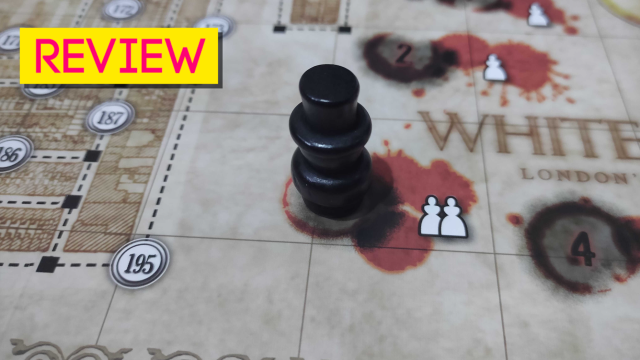Jack the Ripper is on the loose and it’s up to you and your team of intrepid detectives to hunt him through the streets of Whitechapel with minimal clues and the odds stacked against you. This is the set-up for Letters from Whitechapel, a classic board game from the folks at Giochi Uniti. To celebrate the success of the original game, there’s a brand new version now, sporting upgraded playing tokens and streamlined rules.
If you’re in the mood for a more cinematic and haunting adventure, Letters from Whitechapel has you covered.
First-timers will have trouble grasping the intricacies of gameplay, but once you get going there’s a lot of ground to cover.
Setup and How To Play

The setup for Letters from Whitechapel is very easy because there’s minimal components in the box.
All you need to do is fold out the giant game board, separate tokens between the ‘Jack player’ and the ‘detective players’ and fold out the mini screen where Jack hides his movements.
The difficulty of setup lies in explaining all the rules to participating players.
Letters from Whitechapel is a complicated game because it’s based on carefully-plotted phases. You can see some of these spelled out in the above picture, but essentially there’s around 12 turns per every night of gameplay, each with their own unique actions.
It all plays out in a cat-and-mouse style game where detective players (up to five) are tasked with catching Jack the Ripper (one player) as he murders his way through Whitechapel.
Gameplay

Gameplay begins with Jack marking out and choosing victims based on red-coloured board game nodes. His role is to kill five people before the game ends (and get away with it by returning to his hideout), while the detectives monitor the streets for clues and attempt to isolate and arrest him. The detectives can win at any time by discovering Jack in his hideout or ‘catching’ him in the act of murder, while Jack can only win if he gets away with his kills.
Each night plays out in a structured pattern based on play phases which include Jack selecting his victim, detectives deploying themselves on the street and Jack attempting to hide in the ‘hunting’ phase. Jack’s movements are hidden, which means detective players will need to search for clues and cross-reference murder locations to determine where exactly Jack’s gone based on the map grid.
If they stumble across him before he makes it back to his hideout (using special or regular movements to make it home) the game ends and Jack loses.
Every night plays out in tense fashion, with Jack attempting to get past a whole constabulary without incident. There’s rules to make it easier or harder for Jack to escape if you choose to use them, but the basic version of the game is quite balanced. It’s a challenge to find Jack, but it’s easy to stumble across essential clues that’ll lead you to his arrest.
While the game does rely on luck occasionally, all players need to think about their strategies, including where they place their detective tokens and how to catch Jack as quickly as possible. ‘Special’ movement tokens also throw in an added challenge because these allow Jack to make escapes across longer distances. It means all players will need to be on their toes and looking out for potential escape routes.
Once players understand the rules of the game and how each phase plays out it’s much easier to focus on a group strategy and to make more informed decisions about where to search. As the pattern emerges, detectives will be required to draw clues together and finally execute on their planned arrest before Jack escapes.
Whatever the outcome, the dramatic finale is always heart-racing and fun.
The Verdict
Letters from Whitechapel takes a long time to master but once every player knows their strategy and role, it’s a real blast. While you can play the game with two players, the ideal set up requires at least three players, meaning sessions may be harder to organise. It’ll also be difficult for everyone to learn the rules from the get-go. You’ll need to exercise patience when teaching newcomers, but it does become easier to work through as each night plays out.
The learning curve here is fairly significant and there are plenty of rules and steps to memorise, but gameplay itself is quite simple and fun to play through. You’ll need a bit of luck and observation to catch Jack in the act (or to escape, if you’re playing the Ripper) but the cat-and-mouse game at the heart of Letters from Whitechapel is satisfying no matter which way the game plays out.
If you’re looking for a fast-paced game with robust detective mechanics, Letters from Whitechapel is a great option. A larger group is recommended for the best playing session, but with easily adjusted rules even duos will have a lot of fun with the game. Make time to explain the rules in detail, and you’ll be in for a frantic, fun and grisly board game adventure.

Leave a Reply